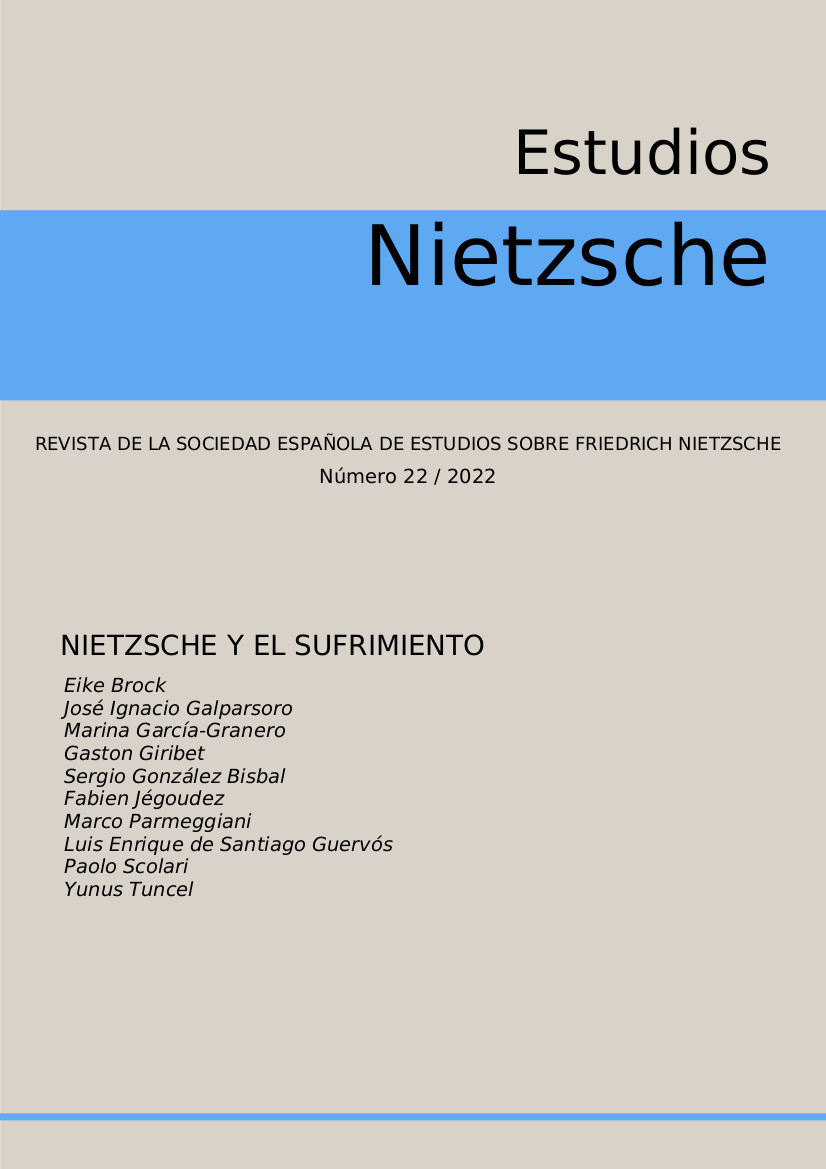Illness, Suffering, Thought. Nietzsche and Human Existence
DOI:
https://doi.org/10.24310/EstudiosNIETen.vi22.14222Keywords:
suffering, illness, human existenceAbstract
Thomas Mann asserts that Nietzsche also has another name: illness. In fact, when you look at life of philosopher of Röcken, it’s impossible not to come across his pathology: beyond the delirious madness that marks the last decade, the whole his existence appears indelibly marked by illness. And in Nietzsche the autobiographical theme of illness is inseparable from the philosophical problem of suffering. By considering his personal experience of illness as crucial, Nietzsche desires to experiment up to the point thought can resist and in which direction it takes whenever it is under the pressure of evil. His sharp investigation shows how the negative cannot be eliminated from existence, nor justified, but it constitutes a necessary ingredient: without tears, man would signify too much joy and one would never arrive at the laughter.
Downloads
Metrics
References
Nietzsche F., Epistolario, 5 voll., Milano: Adelphi, 1976-2011.
Andreas-Salomé L., Friedrich Nietzsche, Milano: SE, 2009.
Anepeta L., Nietzsche. Il terapeuta malato, Roma: Nilalienum, 2012.
Aurenque D., «Über Nietzsches medizinische Deutung der Moral. Das Leiden als Ursprung der Moralität bei Schopenhauer und Nietzsche», in AA.VV., Moralkritik bei Schopenhauer und Nietzsche, Würzburg: Königshausen & Neumann, 2013, pp. 45-60.
Bizzotto M., Male, sofferenza, malattia. Saggi sul dolore, Verona: Camilliani.it, 1981.
Brock E., «Life is suffering. On Schopenhauer’s and Nietzsche’s philosophical engagement with suffering», in AA.VV., Nietzsche, German Idealism and its critics, Berlin - Boston: De Gruyter, 2015, pp. 189-207.
Casini L., La riscoperta del corpo. Schopenhauer, Feuerbach, Nietzsche, Roma: Studium, 1990.
Colli G., Scritti su Nietzsche, Milano: Adelphi.
Deleuze G., Logica del senso, Milano: Feltrinelli, 1975.
Deleuze G., Nietzsche e la filosofia, Milano: Feltrinelli, 1992.
Fallica A., «La malattia di Nietzsche», in AA.VV., Filosofare con Nietzsche, Roma 2002, pp. 99-106.
Förster-Nietzsche E., «Die Krankheit Friedrich Nietzsches»: Die Zukunft, Jg. 8, Berlin 1900, Nr. 30, pp. 9-27.
Hartmann F., «Zur Dialektik von Gesundsein und Kranksein bei Friedrich Nietzsche»: Selbstorganisation, 7 (1996), pp. 131-144.
Hildebrandt K., «Der Beginn von Nietzsches Geisteskrankheit»: Zeitschrift für die gesamte Neurologie und Psychiatrie, Bd. 89, Berlin 1924, pp. 283-309.
Hillesheim J.W., «Suffering and self-cultivation. The case of Nietzsche»: Educational theory, 2 (1986), pp. 171-178.
Jaspers K., Nietzsche. Introduzione alla comprensione del suo filosofare, Milano: Mursia, 1996.
Klossowski P., Nietzsche e il circolo vizioso, Milano: Adelphi, 2013.
Lessing T., «Nietzsches Krankheit»: Biologische Heilkunst, Jg. 11, Stuttgart 1930, pp. 693-694.
Mann T., «La filosofia di Nietzsche», in Id., Nobiltà dello spirito. Saggi critici, Milano: Mondadori, 1953, pp. 679-716.
Manzi A., «Il tema della malattia in Nietzsche. Interpretazioni e valutazioni»: Rivista di Teologia dell’Evangelizzazione, 9 (2005), pp. 559-581.
Möbius P.J., Über das Pathologische bei Nietzsche, Wiesbaden: Bergmann, 1902.
Natoli S., L’esperienza del dolore. Le forme del patire nella cultura contemporanea, Milano: Feltrinelli, 1995.
Nuccitelli G., Il contagio filosofico. L’odissea ideativa di Nietzsche attraverso la lunga infermità, Milano: Guerini, 1996.
O’Sullivan L., «Nietzsche and pain», Journal of Nietzsche studies, 11 (1996), p. 13-22.
Podach E.F., «Nietzsches Krankengeschichte»: Die Medizinische Welt, Jg. 4, Berlin 1930, Nr. 40, pp. 1452-1454.
Saaler B., «Über die Krankheit Nietzsches»: Zeitschrift für Sexualwissenschaft, Bd. 4, Bonn 1918, pp. 289-295.
Schipperges H., Am Leitfaden des Leibes. Zur Anthropologetik und Therapeutik Friedrich Nietzsches, Stuttgart: Klett, 1975.
Schipperges H., «Von der Krankheit zur „großen Gesundheit“», in Id., Homo patiens. Zur Geschichte des kranken Menschen, München - Zürich: Piper, 1985, pp. 210-238.
Senigaglia C., «Schmerz, Krankheit, Genesung. Nietzsches Überlegungen zwischen Wissenschaft und Ethik», in AA.VV., Nietzsche. Sein Denken und dessen Entwicklungspotentiale, Neu-Isenburg: Lenz, 2011, p. 83-112.
Spoladore A., Nietzsche. L’esperienza della malattia sullo sfondo del pensiero, Roma: Il filo, 2008.
Venturelli D., Nobiltà e sofferenza. Musica, religione, filosofia in F. Nietzsche, Genova: Il Melangolo, 2006.
Vozza M., Esistenza e interpretazione. Nietzsche oltre Heidegger, Roma: Donzelli, 2001.
Vozza M., «La “grande salute” e l’ottica binoculare di Nietzsche», in AA.VV., Nietzsche. Illuminismo. Modernità, Firenze: Olschki, 2003, pp. 225-239.
Downloads
Published
How to Cite
Issue
Section
License
As of issue 21 (2021) this journal is published only in open access (diamond route).
From that number 21, like the previous numbers published in NIETZSCHE STUDIES, they are subject to the Creative Commons Acknowledgment-NoComercia-ShareIgual 4.0 license, the full text of which can be consulted at <http://creativecommons.org/licenses/by-nc-sa/4.0 >
It is the responsibility of the authors to obtain the necessary permissions of the images that are subject to copyright.
This work is licensed under a Creative Commons Attribution-NonCommercial-ShareAlike 4.0 International License.
Copyright generates two different rights: moral rights and patrimonial rights that EJFB recognizes and respects. Moral rights are those relating to the recognition of the authorship. They are rights of a personal nature that are perpetual, inalienable, unseizable and imprescriptible as consequence of the indivisible union of the author and his/her work.
Patrimonial rights are those that can be derived from the reproduction, distribution, adaptation or communication of the work, among others.







11.png)
